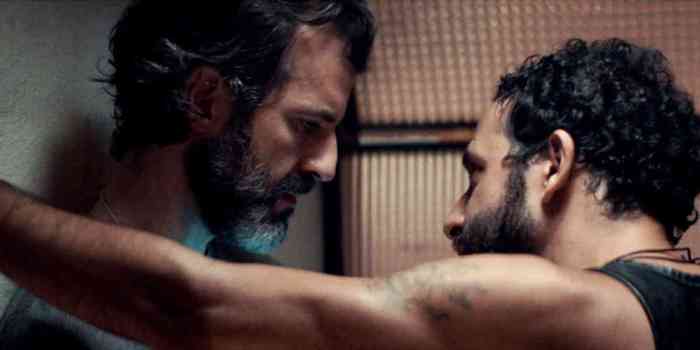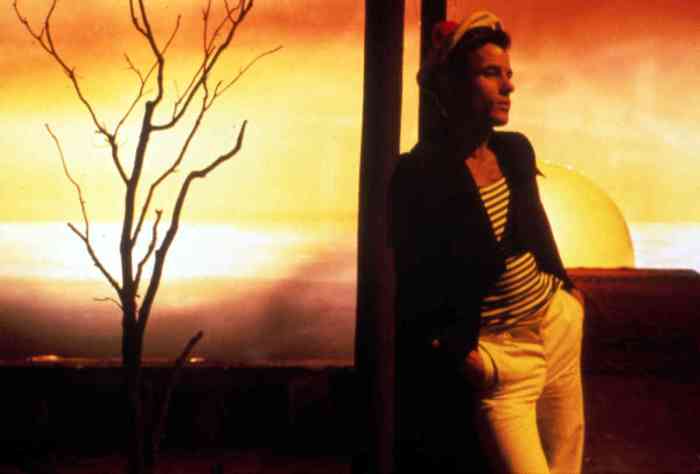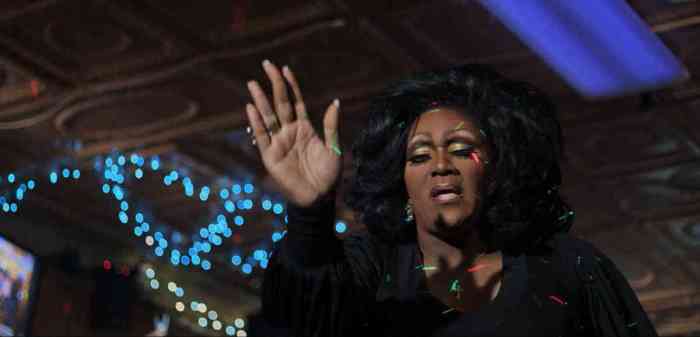Dina Buno and Scott Levin in Dan Sickles and Antonio Santini’s “Dina,” which opens at the Quad Cinema on October 6. | SUBMARINE
Dan Sickles and Antonio Santini’s “Dina” shows a rare attention to form for a documentary about a couple with Asperger’s Syndrome that could easily have become a pity party. For a 10-minute stretch, it never leaves a bench, although the camera is placed in different set-ups, the time of day changes, and the soundtrack veers from the couple talking to an earlier 911 call.
There’s no camera movement in “Dina” and a lot of abrupt editing. The videography looks slightly faded, although nowhere near as grungy as digital video from the early 2000s. Sickles and Santini, whose previous documentary “Mala Mala” explored trans rights in Puerto Rico, avoid the dangers of voyeurism that come with this territory.
One of this year’s most interesting American documentaries, Bryan Fogel’s “Icarus,” borrowed a lot from Hollywood thrillers, and when I interviewed Fogel, he talked more about Paul Greengrass as an influence than any non-fiction filmmaker. “Dina” lifts a great deal from narrative cinema, although not necessarily from Hollywood. It never offers a formal introduction to Dina and Scott. Its storytelling is fairly elliptical; Dina is chatty enough to deliver her backstory — which includes surviving a stabbing (leading to that 911 call) and the death of her first husband from cancer — over the course of the film. Sickles initially met her as a friend of his family.
Dan Sickles, Antonio Santini documentary about Asberger’s couple hits universal notes
That segment on the bench takes a lot of risks, relying as much on sound design as the image. For a long stretch, Scott and Dina are barely visible, occupying about two percent of the frame as they talk. There’s a sudden cut to a medium shot of their conversation. Then, the 911 call is played over a shot of the empty bench at dusk, as the scene is artificially sped up, rapidly becoming dark. The filmmakers suggest half a lifetime passing in 10 minutes.
“Dina” recalls a much milder version of the extreme sexual frankness of this year’s other best documentary releases, Joanna Arnow’s “I hate myself :.)” Arnow depicted her extremely dysfunctional relationship with a man who embodies the concept of “hipster racism” — his idea of fun is going to open mic nights at Harlem comedy clubs and saying the N-word in front of African Americans. Arnow was not afraid to show her vulnerability faced with a man who seemed much more powerful — but then, she was the one wielding the camera on him and he turned up at the opening night screening at Anthology Film Archives to jump onstage and drunkenly rant about how she misrepresented him.
Dina and Scott talk very bluntly about the sexual aspects of their relationship. If “Dina” actually showed them having sex, I think it would risk crossing over into exploitation. The closest it comes is a scene at Dina’s raunchy bachelorette party, where a male stripper mimes having sex with one of her friends as her head bounces above Dina’s lap. Dina discusses a previous lover wanting to experiment with BDSM, which she refused because it was too close to the real abuse she had experienced.
Talking to a male friend, Scott says his fear of sexual errors leads him to make statements like “Sorry dear, I didn’t mean to squirt you in the face.” Even “Magic Mike 2” didn’t go this far. American narrative cinema treats this kind of talk as a joke meant only for R-rated comedies, generally, and documentaries only include it if they’re about sex workers.
“Dina” emphasizes the importance of sex to a working relationship, and here the woman takes the lead. Scott is far more timid. The fact that both Dina and Scott have autism hardly prevents either of them, particularly Dina, from communicating their desires loudly. If they’re talking to each other, they seem aware that the camera is always on; Dina sometimes seems to playing up to it. Sickles and Santini made a remarkably sex-positive film without showing any sex!
“Dina” borrows a lot of techniques from ‘60s direct cinema, but no one would mistake it for a Frederick Wiseman film (although it shares the same absence of editorializing). While tightly focusing on this particular couple, it has a great deal to say about marriage as a whole. It’s easy to forget that Dina and Scott are autistic — and at one point, he reels off a whole list of other mental problems she suffers from. Rather than providing “inspiration porn” based on their condition, Sickles and Santini made a film about the universal drama of watching a relationship mature.
DINA | Directed by Dan Sickles and Antonio Santini | The Orchard | Opens Oct. 6 | Quad Cinema, 34 W. 13th St. | quadcinema.com



































